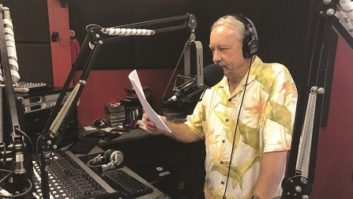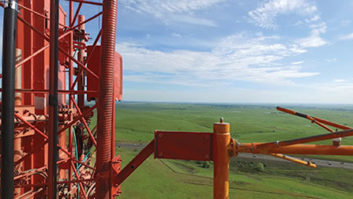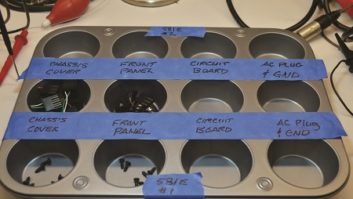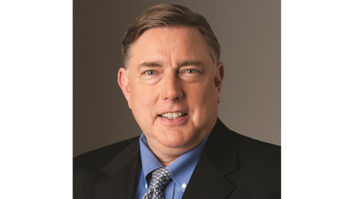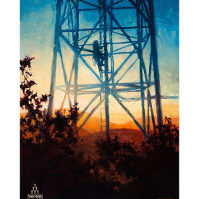We all like to think that this life is all about merit and effort. Somewhere, some higher power gives us all some level of something that eventually translates into everything, including our careers. That�s why it�s not unusual for broadcast engineers to cherish this profession that is also their passion. Engineers love formulaic encounters: Mix the right ingredients and get the right results.
In December 2012, this CBS Radio studio in Dallas looked quite festive.
Photo Credit: Scott Fybush

But this career is never and nothing like that. Other careers seem a lot more predictable.
There is an unusual amount of serendipity in this broadcast thing. You may attribute this to that higher power, or random luck, but it�s probably not right to see where you are as a deterministic product of who you are and what you did to get here. If you are a broadcast engineer, your life has been a pin-ball game of rapid and random events that happen in a blink of the eye.
Today, I have been given guardianship of two younger folks who have only the vaguest idea that life has taken them into broadcasting. I remember that feeling. (Mom is still waiting for me to get a real job, and I wasn�t and will likely never be a decent on-air personality.)
For me, it was a day-timer, and my Christmas gift was the trickle-down of a recently granted few Watts of �pre-sunrise authority.� The transmitter would kick back to 250 Watts, and the dummy load put almost all of that into the studio � thankfully, during that time of year.
The station was walking distance; I didn�t have a driver�s license yet, but I did have an FCC ticket. The PSA hours didn�t produce any measurable revenue, but for me, it was a real radio job, minimum wage, and all I had to do was get there at 4 a.m. I had time to stack my carts and records and the next hour�s stuff so that when the real morning guy arrived at FCC sunrise, all would be ready to go.
One thing lead to another. The highs were high and the lows not so enjoyable, but I�d never trade this ride for any other career.
I recently got an email from a friend who publishes a newsletter for his group of engineers. He�s bemoaning the graying of broadcast engineers. He just came from an SBE national event, and of course its attendees were the men and women who have accomplished much and been involved. It took some work and time in grade to get there. The universe has a time for everything, and that was all about senior members of the profession. You earn that seat.
The new folks don�t look like broadcast engineers, and the skillsets that got them their jobs are gleaned from a list of what the SBE teaches as ongoing education. My company responded to the laws of supply and demand. We need people to do these things; there is a limited number of people with the pedigree, and that demands a price. It�s better than minimum wage.
I�ll do my best to spin them up on Gantt charts and network design. They�ll learn just enough about Smith charts. In the end, there will be enough of the right people doing the things that make broadcast work.
They are a half-century of intense technological evolution removed from the morning I first got to read the sign-on and the required �mechanical reproduction announcement� from the continuity book. I would drop the shift handle on that 18-inch turntable into gear and pot that vinyl recording up as I got used to wearing headphones and learned to judge the mix, in a small studio I left lit with only the Christmas decorations� filaments. I wish they could feel like I felt � feel that magic and adrenaline as I glanced at my license on the wall with all the others and wondered if I could really do this.
It�s a silly wish. This is their Christmas. I hope their gift is that their career can also be their passion.
The Wandering Engineer is an industry stalwart who has been in broadcasting since the days of Marconi and Tesla. He gives his thoughts on the current state of broadcast engineering and the broadcast engineer.







